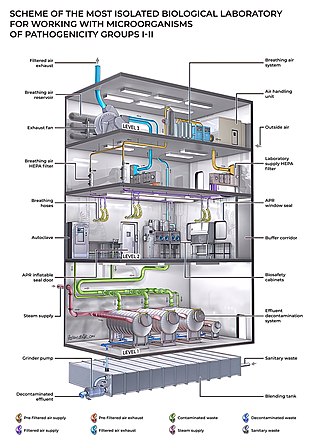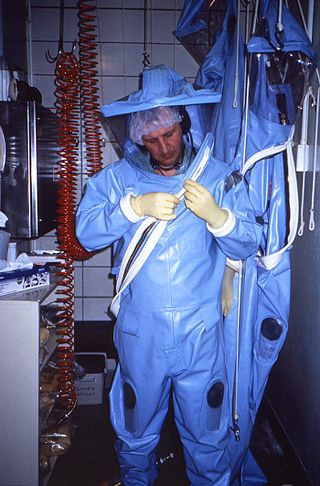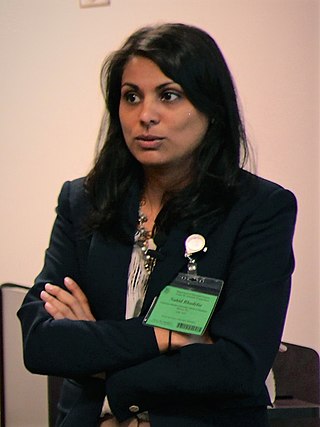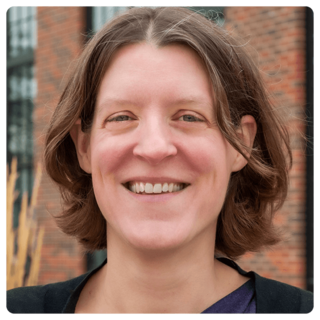
A biosafety level (BSL), or pathogen/protection level, is a set of biocontainment precautions required to isolate dangerous biological agents in an enclosed laboratory facility. The levels of containment range from the lowest biosafety level 1 (BSL-1) to the highest at level 4 (BSL-4). In the United States, the Centers for Disease Control and Prevention (CDC) have specified these levels in a publication referred to as BMBL. In the European Union, the same biosafety levels are defined in a directive. In Canada the four levels are known as Containment Levels. Facilities with these designations are also sometimes given as P1 through P4, as in the term P3 laboratory.
The National Institute of Allergy and Infectious Diseases is one of the 27 institutes and centers that make up the National Institutes of Health (NIH), an agency of the United States Department of Health and Human Services (HHS). NIAID's mission is to conduct basic and applied research to better understand, treat, and prevent infectious, immunologic, and allergic diseases.
The National Microbiology Laboratory (NML) is part of the Public Health Agency of Canada (PHAC), the agency of the Government of Canada that is responsible for public health, health emergency preparedness and response, and infectious and chronic disease control and prevention.

The Influenza Genome Sequencing Project (IGSP), initiated in early 2004, seeks to investigate influenza evolution by providing a public data set of complete influenza genome sequences from collections of isolates representing diverse species distributions.

The Trudeau Institute is an independent, not-for-profit, biomedical research center located on a 42 acres (170,000 m2) campus in Saranac Lake, New York. Its scientific mission is to make breakthrough discoveries that lead to improved human health.

Rocky Mountain Laboratories (RML) is part of the NIH Intramural Research Program and is located in Hamilton, Montana. Operated by the National Institute of Allergy and Infectious Diseases, RML conducts research on maximum containment pathogens such as Ebola as well as research on prions and intracellular pathogens such as Coxiella burnetii and Francisella tularensis. RML operates one of the few Biosafety level 4 laboratories in the United States, as well as Biosafety level 3 and ABSL3/4 laboratories.

The Vaccine Research Center (VRC), is an intramural division of the National Institute of Allergy and Infectious Diseases (NIAID), part of the National Institutes of Health (NIH), US Department of Health and Human Services (HHS). The mission of the VRC is to discover and develop both vaccines and antibody-based products that target infectious diseases.

The Robert Koch Institute (RKI) is a German federal government agency and research institute responsible for disease control and prevention. It is located in Berlin and Wernigerode. As an upper federal agency, it is subordinate to the Federal Ministry of Health. It was founded in 1891 and is named for its founding director, the founder of modern bacteriology and Nobel laureate Robert Koch.

The Galveston National Laboratory (GNL) in Galveston, Texas, United States, is a high security National Biocontainment Laboratory housing several Biosafety level 4 research laboratories. The lab is run by the University of Texas Medical Branch (UTMB) for exotic disease diagnosis and research. The GNL is one of the 15 biosecurity level 4 facilities in the United States and the largest one in the world located on an academic campus.

Positive pressure personnel suits (PPPS)—or positive pressure protective suits, informally known as "space suits", "moon suits", "blue suits", etc.—are highly specialized, totally encapsulating, industrial protection garments worn only within special biocontainment or maximum containment (BSL-4) laboratory facilities. These facilities research dangerous pathogens which are highly infectious and may have no treatments or vaccines available. These facilities also feature other special equipment and procedures such as airlock entry, quick-drench disinfectant showers, special waste disposal systems, and shower exits.

Julie E. Ledgerwood is an American allergist and immunologist, who is the chief medical officer and serves as chief of the Clinical Trials Program at the Vaccine Research Center (VRC) of the National Institute of Allergy and Infectious Diseases (NIAID), part of the National Institutes of Health in Bethesda, Maryland. She is a Doctor of Osteopathic Medicine.
Gary J. Nabel is an American virologist and immunologist who is President and chief executive officer of ModeX Therapeutics in Natick, Massachusetts. He was the founding director of Vaccine Research Center at the National Institute of Allergy and Infectious Diseases.
Peter B. Jahrling is chief of the Emerging Viral Pathogens Section of the National Institute of Allergy and Infectious Diseases.
The National Interagency Biodefense Campus is a facility in Frederick, MD at Fort Detrick. It hosts members of a scientific collaboration, the National Interagency Confederation for Biological Research.
Ansuvimab, sold under the brand name Ebanga, is a monoclonal antibody medication for the treatment of Zaire ebolavirus (Ebolavirus) infection.

Nahid Bhadelia is an American infectious-diseases physician, founding director of Center for Emerging Infectious Diseases Policy and Research (CEID) at Boston University and an associate professor at the Boston University School of Medicine. She served as the Senior Policy Advisor for Global COVID-19 Response on the White House COVID-19 Response Team.

Emmie de Wit is a Dutch-American virologist. She is chief of the molecular pathogenesis unit at the Rocky Mountain Laboratories. Her research combines pathogenesis studies with detailed molecular analyses to identify molecular determinants of severe respiratory tract disease within the virus and the host.

Nancy Jean Sullivan is an American cell biologist researching filovirus immunology and vaccine development. She is a senior investigator and chief of the biodefense research section at the Vaccine Research Center. Her team discovered the monoclonal antibody, mAb114.

Lori Elizabeth Dodd is an American mathematical statistician specializing in clinical trials methodology, statistical analysis of genomic data, design of clinical trials using biomarkers and imaging modalities, and statistical methods for analyzing biomarkers. She is a statistician in the biostatistics research branch at the National Institute of Allergy and Infectious Diseases.

John R. Mascola is an American physician-scientist, immunologist and infectious disease specialist. He was the director of the Vaccine Research Center (VRC), part of the National Institute of Allergy and Infectious Diseases (NIAID), National Institutes of Health (NIH). He also served as a principal advisor to Anthony Fauci, director of NIAID, on vaccines and biomedical research affairs. Mascola is the current Chief Scientific Officer for ModeX Therapeutics.














